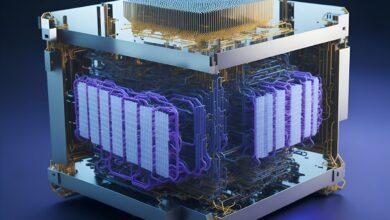Home Crypto Mining – Weighing the Pros and Cons

The allure of cryptocurrency mining has captivated countless individuals, drawing them into the intricate world of digital currencies. This fascination often leads to the consideration of residential mining ventures–operations initiated from the comfort of one’s own home. Such at-home enterprises present a fascinating juxtaposition of benefits and drawbacks that merit careful examination. As we delve into the strengths and weaknesses of home-based cryptocurrency mining, we will uncover the myriad factors that influence its viability as an investment strategy.
On one hand, the advantages of residential crypto mining operations are compelling. The appeal lies not only in the potential for lucrative returns but also in the sense of autonomy and control over one’s financial journey. At-home mining allows enthusiasts to engage directly with the technology behind cryptocurrencies, fostering a deeper understanding of blockchain mechanics and network dynamics. Moreover, the initial setup costs can be relatively manageable, particularly when compared to the vast investments typically associated with larger mining farms.
However, this seemingly attractive landscape is not without its cons. As we explore the disadvantages of home-based cryptocurrency mining, it becomes clear that challenges lurk beneath the surface. The complexities of managing electricity costs, hardware maintenance, and cooling requirements can quickly escalate, potentially negating any financial gains. Additionally, the competitive nature of mining means that individual residential operations may struggle against larger, more efficient mining ventures that dominate the market.
As we navigate through this nuanced discussion, it is essential to weigh both the pros and cons judiciously. By understanding the multifaceted implications of home crypto mining, individuals can make informed decisions about their participation in this rapidly evolving sector. Ultimately, it is through thoughtful analysis that one can appreciate not only the opportunities but also the inherent risks associated with embarking on such a venture.
Pros of Home-Based Crypto Mining: A Balanced Perspective
In the ever-evolving world of cryptocurrency, home-based crypto mining operations have emerged as a tantalizing opportunity for many enthusiasts and investors. One of the primary advantages of these at-home ventures is the accessibility they offer. With a relatively low barrier to entry, individuals can set up mining rigs in their living spaces, utilizing existing hardware or making modest investments in specialized equipment. This democratization of crypto mining allows more people to participate in the blockchain ecosystem, potentially leading to greater decentralization and innovation.
Another significant benefit lies in the potential for profitability. When electricity costs are manageable and mining difficulty remains favorable, home-based miners can reap substantial rewards. The allure of earning cryptocurrency directly from one’s residence is compelling; it creates a sense of autonomy and ownership over one’s financial future. Moreover, for those who understand market dynamics and can time their mining efforts strategically, the rewards can be particularly gratifying, especially during bullish market trends.
However, it is essential to consider the disadvantages and drawbacks that accompany such operations. One of the most pressing issues is the substantial energy consumption associated with crypto mining. Residential setups can lead to increased electricity bills, which may offset any profits earned from mined coins. Furthermore, depending on local regulations and energy sources, this heightened demand can contribute to environmental concerns, raising ethical questions about sustainability in the context of cryptocurrency.
The weaknesses of home-based mining extend beyond financial implications. For instance, noise generated by mining rigs can disrupt household life, particularly in smaller living spaces where noise control is paramount. Additionally, there are risks associated with hardware failure or wear and tear due to continuous operation. Home miners must also remain vigilant against cybersecurity threats; protecting one’s equipment from hacking attempts is crucial for safeguarding both physical assets and digital currencies.
In assessing the strengths of at-home crypto mining ventures, one cannot overlook the educational benefits that come with hands-on experience. Engaging with the technical aspects of mining fosters a deeper understanding of blockchain technology and its underlying mechanics. This experiential learning process equips individuals with valuable skills that may serve them well in future pursuits within the tech space or broader investment landscape.
Ultimately, weighing the pros and cons of home-based crypto mining operations reveals a complex interplay between opportunity and risk. While the advantages–such as accessibility, potential profitability, and educational value–are enticing, they must be carefully balanced against the disadvantages related to costs, noise, hardware maintenance, and security concerns. For those willing to navigate this intricate landscape thoughtfully and strategically, home-based crypto mining can indeed be a rewarding venture worth exploring.
Cost-Effective Setup Options: Benefits and Drawbacks of Residential Crypto Mining
In recent years, the allure of cryptocurrency has led many enthusiasts to consider the prospect of at-home crypto mining as a viable venture. The simplicity of setting up a mining operation at home is appealing, particularly for those drawn by the potential profits of this digital gold rush. However, a thorough examination reveals both pros and cons that must be weighed carefully before embarking on such an endeavor.
One of the primary advantages of residential crypto mining is the cost-effective setup options available to individuals willing to invest time and resources into this operation. With a modest initial investment in hardware–often just a specialized GPU or ASIC miner–anyone can begin mining from the comfort of their own home. Furthermore, many existing setups leverage personal computers, minimizing the need for additional capital expenditures. This access democratizes entry into the world of cryptocurrency, allowing individuals from diverse economic backgrounds to participate in this innovative financial ecosystem.
However, the drawbacks of at-home operations cannot be overlooked. One significant disadvantage is the escalating electricity costs associated with running mining equipment continuously. In regions where electricity rates are high, these operational costs can quickly erode any potential profit margins. Additionally, there are concerns regarding the wear and tear on residential electrical systems, which may not be designed to handle the high power demands typically associated with crypto mining rigs. These operational challenges necessitate careful consideration and planning to ensure that residential setups remain economically viable.
Another factor influencing the success of home-based mining ventures is the competitive nature of the cryptocurrency market itself. As more miners join the fray, the difficulty levels increase, resulting in fewer rewards per unit of computational power contributed. This phenomenon raises critical questions about sustainability; even with low setup costs, ongoing profitability may become elusive in a rapidly evolving landscape. Thus, while some may relish the challenge, others may find themselves disillusioned by diminishing returns.
Moreover, there are environmental considerations tied to at-home crypto operations that warrant discussion. While some proponents argue that residential mining can be powered by renewable energy sources–thus minimizing ecological impact–the reality is often more complex. Many home miners rely on traditional energy grids that may still depend heavily on fossil fuels. This presents both ethical dilemmas and potential regulatory risks as governments increasingly scrutinize the environmental footprint of cryptocurrency mining activities.
In conclusion, while the strengths of home crypto mining ventures include accessibility and cost-effectiveness, they are counterbalanced by notable weaknesses such as rising operational costs and competitive pressures in the market. Individuals considering entering this space must conduct thorough research and weigh their specific circumstances against these pros and cons to make informed decisions regarding their involvement in residential cryptocurrency operations. Awareness of these factors will ultimately determine whether home-based mining remains an attractive option or transitions into a cautionary tale within the broader narrative of digital currencies.
Pros and Cons of Home-Based Crypto Mining Operations
The allure of cryptocurrency mining from the comfort of one’s home is undeniably compelling. Among the primary strengths of at-home crypto ventures lies their flexibility and convenience. Individuals can set up operations as they see fit, choosing the hardware that suits their budget and space constraints. This personalized approach often leads to a unique arrangement where miners can tweak their systems for optimal performance, aligning with their own schedules and preferences. However, this very flexibility can also manifest as a double-edged sword, where the lack of structured oversight may lead to inefficiencies or improper management of resources.
When evaluating the strengths and weaknesses of residential crypto mining, one must consider the significant financial implications. On one hand, the benefits include reduced overhead costs compared to commercial mining operations, allowing enthusiasts to engage in crypto without substantial initial investment. Additionally, home miners may enjoy tax advantages depending on local regulations. Conversely, the drawbacks are equally pronounced; electricity consumption can skyrocket, leading to inflated utility bills that might negate profits. Furthermore, the volatility of cryptocurrency prices poses an inherent risk; what seems like a profitable venture today may turn sour tomorrow if market conditions shift unfavorably.
The landscape of at-home cryptocurrency mining is rife with both advantages and disadvantages that potential miners must navigate carefully. One notable advantage is the ability to mine a diverse range of cryptocurrencies, providing miners with opportunities to capitalize on emerging trends in the digital currency arena. Yet, this diversity comes with its own set of challenges; selecting the right currencies to mine requires ongoing research and adaptability in a fast-paced market. Additionally, home miners often face competition from large-scale operations that benefit from economies of scale, making it crucial for individuals to stay informed about technological advancements and market shifts.
Ultimately, those contemplating residential crypto mining must weigh these pros and cons judiciously. While the prospect of profitable returns can be enticing, it is essential to approach such ventures with a realistic understanding of both the potential benefits and pitfalls. By recognizing the operational intricacies involved and preparing for unforeseen challenges, aspiring miners can better position themselves within this dynamic ecosystem. The world of cryptocurrency continues to evolve rapidly; therefore, staying educated and adaptable will be key to navigating this complex yet exciting domain.
The Pros and Cons of Home-Based Cryptocurrency Mining Operations
In the ever-evolving landscape of cryptocurrency, the potential for high returns has attracted numerous investors to consider the viability of home-based mining operations. These ventures can offer significant financial rewards, especially when market conditions are favorable. However, the lucrative nature of crypto mining is often accompanied by a myriad of challenges that must be carefully weighed. Understanding both the strengths and weaknesses of residential crypto mining is essential for anyone contemplating this endeavor.
One of the primary advantages of at-home cryptocurrency mining is the reduced overhead costs compared to commercial mining operations. Individuals can leverage their existing infrastructure, such as electricity and space, to initiate their mining activities. This can lead to a more favorable return on investment (ROI), particularly if one can access low-cost energy sources or utilize energy-efficient hardware. Additionally, the convenience of operating from home allows miners to manage their operations more effectively, making real-time adjustments based on market fluctuations and mining difficulty.
However, home-based mining also presents notable drawbacks. The initial investment in specialized hardware can be substantial, with top-tier mining rigs costing thousands of dollars. Moreover, the ongoing expenses associated with electricity consumption can quickly erode profits, especially in regions where energy prices are high. Furthermore, residential setups may face limitations in terms of cooling solutions; inadequate temperature control can lead to hardware failures and increased maintenance costs, ultimately impacting overall profitability.
When evaluating the benefits of residential crypto mining ventures, it is crucial to consider the flexibility they offer. Miners can choose when to operate their rigs and which cryptocurrencies to focus on, allowing them to adapt to market trends dynamically. This agility can be a significant advantage over larger mining farms that may have rigid operational structures. Additionally, engaging in home-based operations fosters a sense of community among fellow miners, as individuals often share insights and strategies through various online forums and social media platforms.
On the flip side, there are considerable weaknesses inherent in at-home cryptocurrency mining. The volatility of the cryptocurrency market poses a constant risk; prices can swing dramatically within short time frames, affecting miners’ earnings unpredictably. Moreover, regulatory uncertainty surrounding cryptocurrency can create additional concerns for home miners. Changes in local laws or taxation policies could significantly impact the feasibility and legality of residential mining operations.
In conclusion, while the potential for high returns in home-based cryptocurrency mining is undeniable, it is essential to approach this venture with a comprehensive understanding of its advantages and disadvantages. Balancing the pros and cons requires careful consideration of individual circumstances, including available resources and risk tolerance. As with any investment strategy, those who wish to embark on this journey should conduct thorough research and remain vigilant about market changes to navigate the complexities associated with residential crypto mining successfully.





